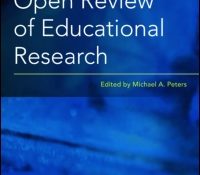tandfonline.com har udgivet en rapport under søgningen “Teacher Education Mathematics”: ABSTRACT ABSTRACT The increasing global warming and the loss of biodiversity should concern us all. Some feel that outdoor activities, which take place in natural surroundings, should have a special obligation to change. In this article I present an example of what an outdoor life practice that responds to the ecological crisis could look like. I use the simple Norwegian outdoor life called friluftsliv, and the deep ecological version suggested by philosopher and climber Arne Næss (1912–2009) as an example and case. Naessian friluftsliv is interesting and relevant in three ways. First, Naess gave a philosophical basis for friluftsliv, building on deep ecology and Spinozism. Second, he presented content, norms and guidelines for a deep ecological friluftsliv. And third, he… Continue Reading →
Like this:
Like Loading...
tandfonline.com har udgivet en rapport under søgningen “Teacher Education Mathematics”: ABSTRACT ABSTRACT This introduction to the Media Ecology special issue of the Review of Communication provides a broad overview of the history of media ecology, clarifies its main orientations and key thinkers, and then illustrates how problems and orientations within philosophy are symptoms of various kinds of technological mediation. Link til kilde
Like this:
Like Loading...
tandfonline.com har udgivet en rapport under søgningen “Teacher Education Mathematics”: Link til kilde
Like this:
Like Loading...
tandfonline.com har udgivet en rapport under søgningen “Teacher Education Mathematics”: ABSTRACT ABSTRACT Dewey was perhaps the foremost theorist and advocate of participatory democracy as an ethical ideal based on a belief and faith in human experience as a general theory of education that would generate the requisite aims and methods for what he called ‘organized intelligence’ and what we might call today ‘collective intelligence’ – that is, as he says, ‘faith in democracy is all one with faith in experience and education’. In this paper we revisit Dewey’s Democracy and Education. An introduction to the philosophy of education (1916/2001) in order to evaluate the growth and development of democracy against the decline of social democracy in the West. We identify the three turns which separate democracy of Dewey’s times and… Continue Reading →
Like this:
Like Loading...
eric.ed.gov har udgivet: The acronym STEM is a ubiquitous term for seemingly anything in–or related to–the fields of science, technology, engineering, and mathematics, and the current dominant educational STEM discourse in teacher education is often organized around questions of how to integrate math and science into the other content areas or vice versa. The purpose of this article is to pose a different question: “How can an ecological model for subject inquiry become the organizing focus for an integrated ecological inquiry?” In this article, the author provides a glimpse of where educators are currently in their thinking and writing as they put theory to work in teacher education. For the past few years, educators have been working on a number of exciting endeavors in teacher education, ranging from theoretical explorations… Continue Reading →
Like this:
Like Loading...



